nj inheritance waiver tax form 01 pdf
The NJ Inheritance Waiver Tax Form 01 is a legal document required to transfer assets from a decedent’s estate to beneficiaries in New Jersey․
It serves as written consent from the Director of the Division of Taxation, enabling the release of property without delays in estate administration․
The form is essential for complying with New Jersey’s inheritance tax laws and ensuring smooth asset distribution to beneficiaries․
Overview of the Form
The NJ Inheritance Waiver Tax Form 01 is a legal document used to obtain consent from the New Jersey Division of Taxation for transferring or releasing property from a decedent’s estate․ It is required for beneficiaries or executors to ensure assets are distributed according to state inheritance tax laws․ The form simplifies the process of transferring real property, funds, or securities without unnecessary delays․ It must be completed accurately and submitted with the necessary documentation to avoid complications in estate administration․ This form plays a crucial role in facilitating the legal transfer of inheritance in New Jersey․
Purpose of the NJ Inheritance Waiver Tax Form 01
The primary purpose of the NJ Inheritance Waiver Tax Form 01 is to grant beneficiaries or executors consent from the New Jersey Division of Taxation to transfer or release property from a decedent’s estate․ This form ensures compliance with state inheritance tax laws by confirming that all tax obligations have been met․ It facilitates the legal distribution of assets, including real estate, funds, and securities, without delays․ By submitting this waiver, the executor or beneficiary obtains the necessary approval to proceed with the estate’s administration efficiently․
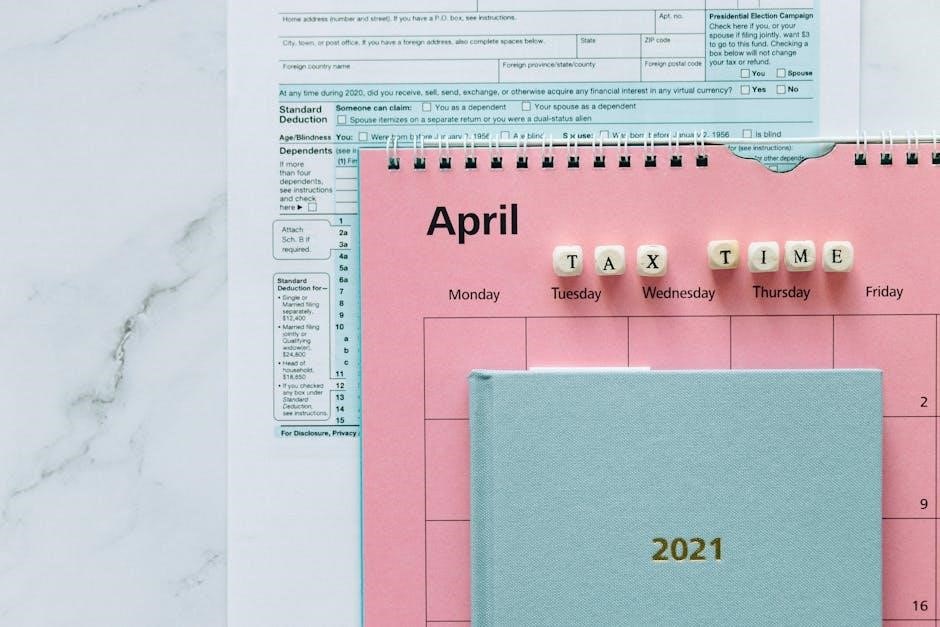
Key Features of the NJ Inheritance Waiver Tax Form 01
Structure and Components of the Form
The form includes sections for beneficiary information, estate details, and asset descriptions․ It requires signatures from executors or beneficiaries, ensuring compliance with tax regulations and smooth asset transfer․
The NJ Inheritance Waiver Tax Form 01 is structured to facilitate the legal transfer of assets from a decedent’s estate to beneficiaries․ It includes sections for beneficiary information, estate details, and descriptions of assets․ The form requires the inclusion of inventory lists, appraisals, and tax return references․ Signatures from executors or beneficiaries are mandatory, ensuring compliance with inheritance tax regulations․ Attachments such as estate tax returns or waivers may also be required․ The form is designed to streamline the asset transfer process while adhering to New Jersey’s tax laws and procedures․
Legal Implications of the Waiver
The NJ Inheritance Waiver Tax Form 01 carries significant legal implications, as it grants the Director of Taxation’s consent to transfer assets without further tax obligations․ By signing the waiver, beneficiaries acknowledge that all applicable taxes have been paid or accounted for․ The waiver prevents future disputes regarding asset distribution and ensures compliance with New Jersey’s inheritance tax laws․ It is a legally binding document that finalizes the estate’s tax obligations, allowing heirs to receive their inheritance without legal or financial hurdles․
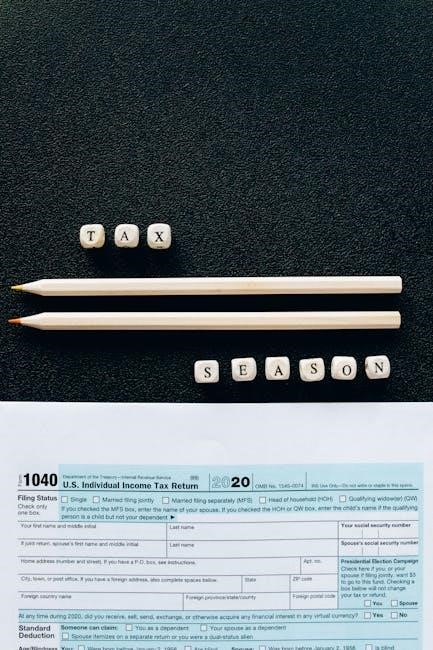
Who Needs to File the NJ Inheritance Waiver Tax Form 01
Executors, administrators, and Class A beneficiaries must file the NJ Inheritance Waiver Tax Form 01 to transfer assets legally and finalize estate administration in New Jersey․
Beneficiaries and Executors
Beneficiaries and executors are directly involved in filing the NJ Inheritance Waiver Tax Form 01․ Executors, responsible for estate administration, must ensure assets are distributed according to the decedent’s will or state law․ Beneficiaries, particularly Class A beneficiaries, have legal rights to inheritance and must consent to asset transfers․ Both parties play a crucial role in completing and submitting the form to facilitate the legal transfer of property and avoid delays in estate settlement․ Their cooperation ensures compliance with New Jersey’s inheritance tax regulations and smooth asset distribution․
Class A Beneficiaries and Their Rights
Class A beneficiaries in New Jersey, typically spouses, domestic partners, and certain relatives, hold specific rights regarding inheritance․ They are exempt from inheritance tax on transfers of real or tangible personal property․ Additionally, Class A beneficiaries can execute a self-executing waiver using Form L-8, streamlining asset transfers without waiting for tax clearance․ These rights ensure their interests are protected, and they receive their entitled share of the estate efficiently․ Their priority status under state law simplifies the inheritance process and reduces administrative burdens․

When is the NJ Inheritance Waiver Tax Form 01 Required
The NJ Inheritance Waiver Tax Form 01 is required when transferring assets from a decedent to beneficiaries, particularly for real property, funds, or securities in New Jersey․
Transfer of Assets in New Jersey
The NJ Inheritance Waiver Tax Form 01 is necessary when transferring assets such as real property, funds, or securities from a decedent to beneficiaries in New Jersey․ This form ensures compliance with state inheritance tax laws and facilitates the legal release of assets․ It prevents delays in estate administration by providing the required consent for asset distribution․ The form is particularly relevant for resident decedents and certain types of property held within the state․ Proper completion and submission of the waiver are essential to avoid legal or financial complications during the transfer process․
Release of Property from the Decedent’s Name
The NJ Inheritance Waiver Tax Form 01 is crucial for releasing property from the decedent’s name to beneficiaries․ This form provides the necessary consent from the Director of the Division of Taxation to transfer assets, ensuring compliance with inheritance tax requirements․ The waiver must be obtained before property can be legally released, and it is only granted once any owed taxes are paid or accounted for․ Executors and beneficiaries must sign the form, which applies to various types of assets, including real estate and funds held in financial institutions․ Proper execution ensures a smooth transfer process․
The Tax Waiver Process in New Jersey
The tax waiver process involves obtaining consent from the Director of the Division of Taxation to transfer or release property from the decedent’s name․ Beneficiaries or executors must submit Form 0-1, providing required documentation and ensuring all taxes are paid․ The process ensures compliance with inheritance tax laws, facilitating smooth asset distribution․ Proper execution of the waiver is essential for legal transfer, avoiding delays in estate administration․ This step is critical for releasing property to beneficiaries efficiently․
Steps to Obtain a Waiver
To obtain a waiver, beneficiaries or executors must first identify the need for Form 0-1 and download it from the New Jersey Division of Taxation website․ The form must be completed accurately, providing details about the decedent’s estate, assets, and beneficiaries․ Signatures from all parties involved are required, ensuring consent for the asset transfer․ Once completed, the form is submitted to the Division of Taxation for review․ After verification and approval, the waiver is granted, allowing the release of property from the decedent’s name to the beneficiaries․ This process ensures legal compliance and facilitates smooth asset distribution․
Role of the Director of the Division of Taxation
The Director of the Division of Taxation plays a crucial role in the waiver process by reviewing and approving Form 0-1․ Their primary responsibility is to ensure that all tax obligations are met before granting consent for asset transfers․ The Director verifies the accuracy of the submitted information and confirms that any applicable inheritance taxes have been paid or provided for․ Once satisfied, the Director issues the waiver, enabling the legal transfer of property from the decedent’s estate to the designated beneficiaries․ This step is essential for maintaining compliance with New Jersey’s tax laws and ensuring the integrity of the estate administration process․
Types of Property Covered by the Waiver
The waiver applies to various assets, including real property, funds in financial institutions, and brokerage accounts, ensuring their smooth transfer to beneficiaries․
New Jersey Real Property
New Jersey real property, such as houses, land, or commercial buildings, requires a waiver to transfer ownership from the decedent to beneficiaries․
The NJ Inheritance Waiver Tax Form 01 is essential for releasing real property, ensuring the transfer process complies with state tax regulations and avoids delays․
Approval from the Director of the Division of Taxation is mandatory, making this form a critical step in legally transferring real estate assets in New Jersey․
Funds in Financial Institutions
Funds held in New Jersey financial institutions, such as bank accounts or CDs, require the NJ Inheritance Waiver Tax Form 01 for transfer to beneficiaries․
This form ensures compliance with state tax laws, allowing the release of these funds without legal or administrative delays․
It is a necessary step to facilitate the smooth distribution of financial assets from the decedent’s estate to the rightful heirs or beneficiaries․
Brokerage Accounts and Securities
Brokerage accounts and securities are also subject to the NJ Inheritance Waiver Tax Form 01 requirements for asset transfer․
The form ensures these assets, such as stocks and bonds, are released from the decedent’s name to beneficiaries in compliance with state tax regulations․
Obtaining this waiver is crucial to avoid delays in transferring financial securities, as it confirms the Director of Taxation’s consent for the asset distribution․
It is an essential step in the estate administration process, ensuring proper handling of investment-related assets․
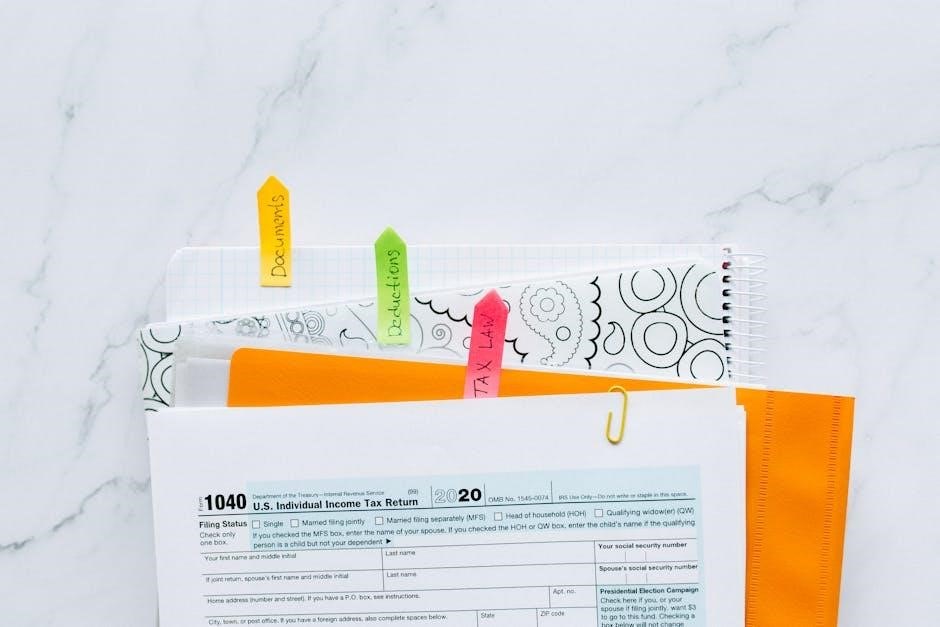
How to Complete the NJ Inheritance Waiver Tax Form 01
Start by downloading Form 01 from the New Jersey Division of Taxation website and thoroughly reviewing the instructions provided․
Gather necessary documents, including the decedent’s estate information, death certificate, and beneficiary details, to ensure accurate completion․
Fill in the decedent’s personal information, list all assets with their values, and note any applicable deductions or exemptions․
Sign the form as the executor or a Class A beneficiary, ensuring compliance with New Jersey’s inheritance tax regulations․
Submit the completed form to the Division of Taxation, either by mail or online, adhering to specified submission guidelines to avoid delays or penalties․
Required Information and Documentation
To complete the NJ Inheritance Waiver Tax Form 01, you must provide detailed information about the decedent’s estate, including the gross estate value and deductions;
List all assets, such as real property, funds in financial institutions, and securities, with their respective values and descriptions․
Attach supporting documents, including the death certificate, will (if applicable), and identification of beneficiaries․
Include details about any taxes owed or paid, ensuring compliance with New Jersey’s inheritance tax regulations․
Sign the form as the executor or a Class A beneficiary to confirm the accuracy of the submitted information and request the waiver․
Signature and Consent Requirements
The NJ Inheritance Waiver Tax Form 01 must be signed by the executor or a Class A beneficiary to confirm the accuracy of the information provided․
All beneficiaries must consent to the waiver, ensuring mutual agreement on the asset distribution and tax obligations․
The signature process is a critical step, as it validates the form and authorizes the transfer of property from the decedent’s estate․
Failure to obtain proper signatures and consent may delay the processing of the waiver and the release of assets․
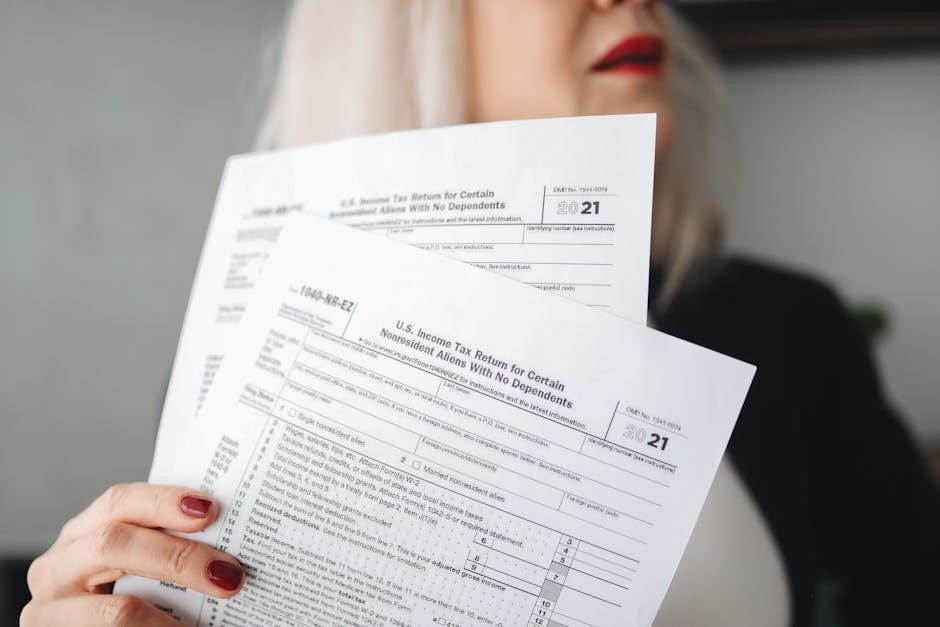
Submission and Processing of the Form
The completed Form 01 must be submitted to the New Jersey Division of Taxation for review and approval, with processing times varying based on the complexity of the estate․
Where to Submit the Form
The completed NJ Inheritance Waiver Tax Form 01 must be submitted to the New Jersey Division of Taxation․ Beneficiaries or executors can mail the form to the Division’s address or submit it in person at designated offices․ A cover sheet, available online, should accompany the form to ensure proper processing․ For convenience, the Division also provides an online submission option through their official website․ Ensure all required documents are included to avoid delays in processing․
Processing Time and Notifications
The processing time for the NJ Inheritance Waiver Tax Form 01 varies depending on the workload of the Division of Taxation․ Generally, it can take several weeks for the form to be reviewed and approved․
Once processed, the Division will send a notification to the submitter, either via email or mail, confirming the waiver’s approval․ Beneficiaries or executors should retain this confirmation for their records․ If no notification is received within a reasonable timeframe, follow-up with the Division is recommended to ensure the waiver has been processed correctly․

Consequences of Not Filing the Waiver
Failing to file the NJ Inheritance Waiver Tax Form 01 can result in delays in transferring assets from the decedent’s estate to beneficiaries․
Penalties and interest may also be incurred if the waiver is not submitted in a timely manner, complicating the estate administration process further․
Delays in Asset Transfer
Failing to file the NJ Inheritance Waiver Tax Form 01 can significantly delay the transfer of assets from the decedent’s estate to beneficiaries․
Without the waiver, financial institutions and other entities may refuse to release funds or property, causing prolonged estate administration․
This can lead to extended waiting periods for heirs, especially for real estate transactions or accessing brokerage accounts․
Delays may also result in additional complications, such as accrued interest or penalties, further complicating the settlement process․
Executors must prioritize filing the waiver to avoid unnecessary hold-ups and ensure timely distribution of the decedent’s assets․
Penalties and Interest
Failing to file the NJ Inheritance Waiver Tax Form 01 can result in penalties and interest on unpaid taxes, increasing the financial burden on the estate․
The New Jersey Division of Taxation imposes these penalties to ensure compliance with inheritance tax laws and regulations․
Interest accrues on unpaid taxes from the date they were due, leading to additional costs for the estate and its beneficiaries․
Penalties and interest can delay the settlement of the estate and create further complications in asset distribution․
It is crucial to file the form promptly to avoid these financial consequences and ensure a smooth estate administration process․

Related Forms and Documents
Essential forms accompanying the NJ Inheritance Waiver Tax Form 01 include the NJ Form L-8 for self-executing waivers and the NJ Form L-9 for preliminary requests․
NJ Form L-8 (Self-Executing Tax Waiver)
NJ Form L-8 is a self-executing tax waiver used to release assets in an estate when no New Jersey inheritance or estate tax is due․ It simplifies the transfer process for Class A beneficiaries, such as spouses, children, or parents of the decedent․ This form eliminates the need for prior approval from the Division of Taxation, allowing for quicker asset distribution․ It is only valid if all beneficiaries are Class A and no tax return is required․ The form must be completed accurately to ensure compliance with state tax regulations and avoid delays in estate administration․
NJ Form L-9 (Preliminary Waiver Request)
NJ Form L-9 is a preliminary waiver request used when a complete inheritance or estate tax return cannot be filed immediately․ It allows for the release of specific estate assets before the final tax determination․ This form is typically required when no inheritance or estate tax is owed, and all beneficiaries are Class A (e․g․, spouses, children, or parents of the decedent)․ The L-9 waiver enables the transfer of assets without delays, facilitating estate administration while ensuring compliance with New Jersey tax regulations․
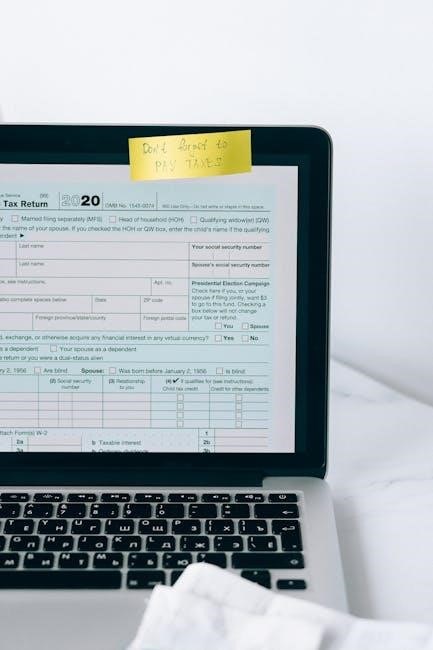
Tax Implications and Exemptions
The NJ Inheritance Waiver Tax Form 01 ensures compliance with tax obligations, while exemptions apply to Class A beneficiaries, such as spouses and direct descendants, reducing tax burdens․
New Jersey Inheritance Tax Rates
New Jersey inheritance tax rates range from 0% to 16%, depending on the beneficiary’s relationship to the decedent and the estate’s value․ Class A beneficiaries, such as spouses, children, and parents, are exempt from inheritance tax․ Other beneficiaries, like siblings, may face higher tax rates․ The tax is applied to the estate’s value after deductions and exemptions․ Estates valued below the exemption threshold may not owe taxes․ Understanding these rates is crucial for accurate tax calculations and ensuring compliance with state inheritance tax laws․
Exemptions for Class A Beneficiaries
Class A beneficiaries, including spouses, children, and parents, are fully exempt from New Jersey inheritance tax․ This exemption applies regardless of the estate’s value, ensuring these beneficiaries receive their inheritance without tax liability․ The waiver form simplifies the process for these individuals, allowing direct asset transfer․ This exemption underscores New Jersey’s policy to protect close family members from additional financial burdens during estate distribution, making the waiver process straightforward for them compared to other beneficiary classes․
Special Cases and Exceptions
Special cases include non-resident beneficiaries and charitable donations, which may require additional documentation or exemptions under New Jersey inheritance tax laws․
Non-Resident Beneficiaries
Non-resident beneficiaries may face unique tax implications when inheriting assets in New Jersey․ Their tax obligations depend on the decedent’s residency and the type of property transferred․ While New Jersey does not impose an inheritance tax on non-resident beneficiaries for certain assets, they must still comply with filing requirements and provide necessary documentation․ Exemptions may apply under specific circumstances, but consulting a tax professional is recommended to navigate these complexities and ensure compliance with state tax laws․
Charitable Donations and Tax-Exempt Organizations
Charitable donations to tax-exempt organizations may qualify for exemptions under New Jersey inheritance tax laws․ When assets are transferred to qualified charities, they are typically excluded from the taxable estate, reducing potential tax liabilities․ The NJ Inheritance Waiver Tax Form 01 requires documentation of such donations to ensure compliance․ Beneficiaries or executors must specify the charitable organization and the value of the donation․ This process helps in accurately assessing the taxable estate and applying applicable exemptions, simplifying the transfer of assets to tax-exempt entities․

Common Mistakes to Avoid
Common errors include submitting incomplete or inaccurate information, missing deadlines, and failing to obtain required signatures․ Ensure all details are correct to avoid delays or penalties․
Incorrect or Incomplete Information
One of the most frequent mistakes is providing inaccurate or incomplete details on the NJ Inheritance Waiver Tax Form 01․ This can lead to delays in processing and potential penalties․ Common errors include incorrect beneficiary information, missing signatures, or outdated asset values․ Failing to disclose all required assets or misreporting their values can also cause issues․ It is crucial to double-check all information before submission to ensure compliance and avoid complications․ Consulting with a tax professional can help prevent such oversights and streamline the process․
Missing Deadlines for Filing
Failing to file the NJ Inheritance Waiver Tax Form 01 by the required deadline can result in significant delays in transferring assets to beneficiaries․ Delays may occur if the form is submitted late, causing the estate administration process to stall․ Penalties and interest may also be imposed for late submissions; It is crucial to adhere to the specified timelines to ensure a smooth transfer of property and avoid additional complications․ Proper planning and timely submission are essential to prevent such issues and maintain compliance with New Jersey’s tax regulations․
FAQs About the NJ Inheritance Waiver Tax Form 01
The NJ Inheritance Waiver Tax Form 01 is used to transfer assets from a decedent’s estate to beneficiaries in compliance with New Jersey tax laws․ It ensures proper legal consent for asset distribution, avoiding delays and penalties․ Beneficiaries or executors must file this form to release property held in the decedent’s name․ Additional information and forms, such as the L-8 or L-9, may be required depending on the estate’s circumstances․
Who Can Sign the Waiver?
The waiver can be signed by Class A beneficiaries, such as spouses, children, or parents of the decedent, or by the executor of the estate․ Class A beneficiaries have priority under New Jersey inheritance tax laws and are typically entitled to sign the waiver․ If all beneficiaries are Class A and no tax is due, a self-executing waiver (Form L-8) can be used․ The executor must act in accordance with the estate’s best interests and ensure compliance with all legal requirements when signing the waiver on behalf of the estate․
Can the Waiver Be Revoked?
A waiver cannot be revoked once it has been executed and filed with the Division of Taxation․ Beneficiaries or executors who sign the waiver do so under penalty of perjury, ensuring the information provided is accurate․ Revocation is not permitted as it would undermine the legal process and the rights of all parties involved․ Once granted, the waiver is final and binding, facilitating the transfer of assets as intended by the decedent and in accordance with New Jersey tax laws․
The NJ Inheritance Waiver Tax Form 01 is essential for transferring assets and complying with New Jersey tax laws, ensuring beneficiaries receive their inheritance smoothly and legally․
Importance of Compliance
Compliance with the NJ Inheritance Waiver Tax Form 01 is crucial to avoid legal and financial complications․ Proper filing ensures assets are transferred efficiently, maintaining estate integrity․ Non-compliance risks delays, penalties, and interest, complicating the inheritance process․ Beneficiaries must adhere to New Jersey tax laws, ensuring all requirements are met accurately․ Timely and correct submission of the form prevents disputes and safeguards the rights of all parties involved in the estate distribution process․
Final Tips for Filing the Form
Ensure all information is accurate and complete to avoid delays․ Submit the form on time to prevent penalties․ Include all required documentation, such as asset details and beneficiary information․ Consult a tax professional if unsure about any step․ Double-check signatures and consent from all parties․ Verify the form aligns with current New Jersey tax laws․ Keep a copy for personal records․ By following these steps, you can streamline the process and ensure compliance with state regulations․
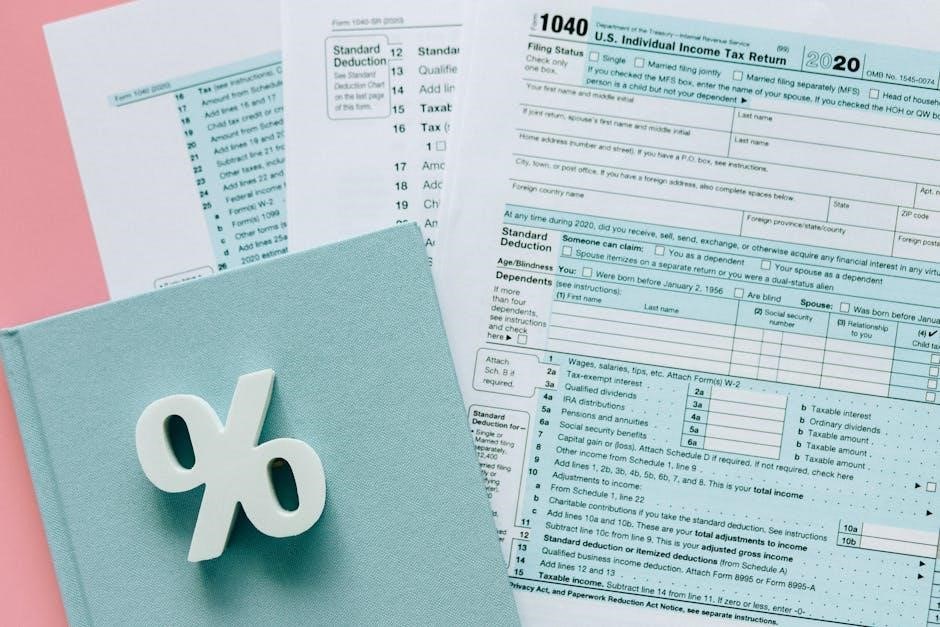






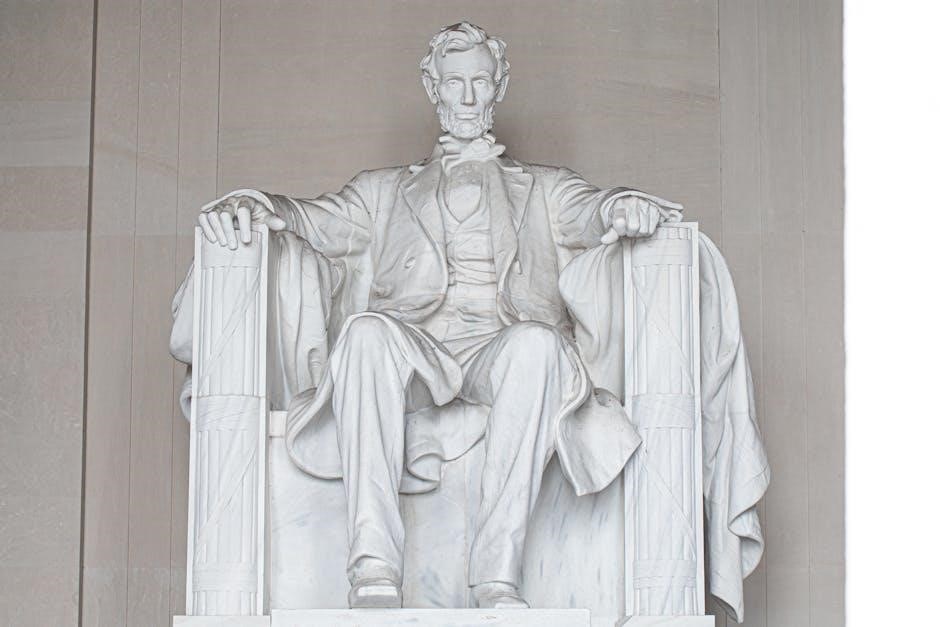
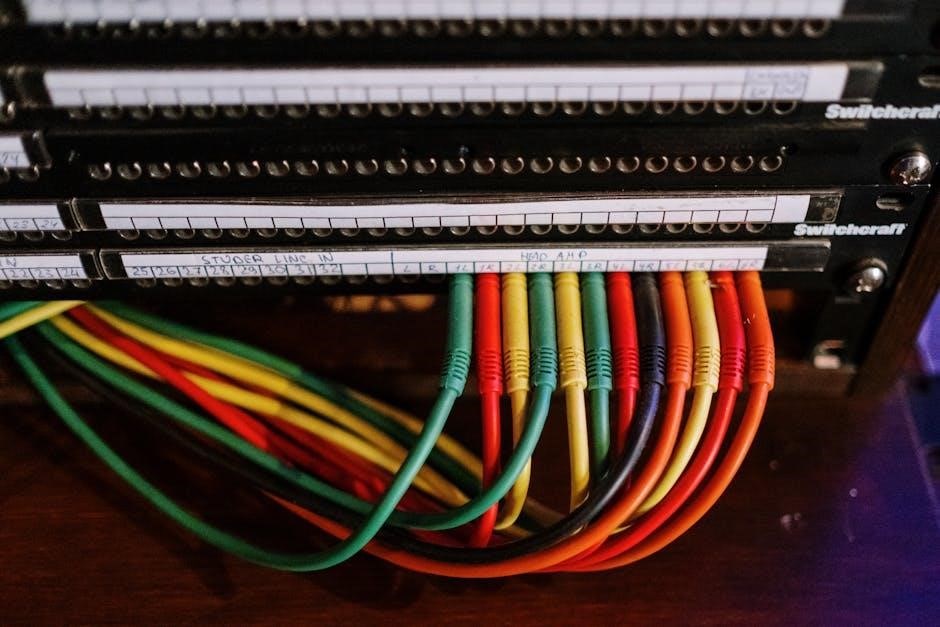


Leave a Comment